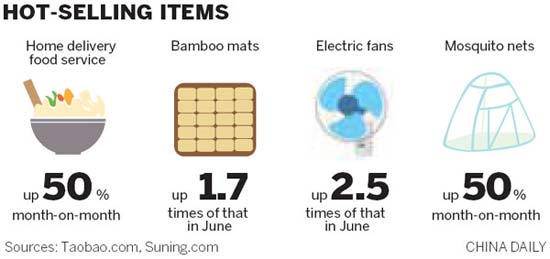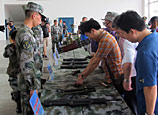
 |
Online sales and delivery services have been boosted by extremely hot weather in most parts of East and South China over much of the last month.
Shanghai Meteorological Bureau issued a heat-wave red alert on Wednesday afternoon, the third time the weather authority has raised the warning this summer.
China Meteorological Administration issued a national second-level heat-wave alert on Tuesday, the highest alert in the country's history. The administration said temperatures in southern China will exceed 35 degrees Celsius from Tuesday to Aug 8, with some places expected to see the mercury hit record highs.
The frequency of customers buying food on Taobao.com, the largest e-commerce platform in China, doubled in July month-on-month. The sales revenue of food deliveries on Taobao also increased by 50 percent in July over June.
Sales of commodities that help fight the heat have risen. For example, the number of bamboo sleeping mats - traditionally believed to be cooling - that have been sold increased by 1.7 times and that of fans surged 2.5 times. Sales of mosquito nets were up by 50 percent.
Sales of air-conditioners, fans and refrigerators soared by 40 to 80 percent in July month-on-month on Suning.com, another leading e-commerce platform. Suning noted orders for small fans came mostly from people who work in offices.
Sales of other items such as sunblock cream and parasols were almost four times the number sold in other seasons.
"Orders have soared by leaps and bounds recently. But we are fully prepared for that. We have also hired more people to ease the pressure on deliveries," said Chen Gongjing, director of the marketing department at Suning.com.
The extreme heat has also caused the so-called lazy economy to thrive. Errand-running, which is in this category, rose in Shanghai.
"We have had more orders to deliver coffee or lunch from cafes or restaurants that do not offer delivery services this week because it is really too hot outside," said 30-year-old Zhang Dongke, general manager of shanghaipaotui.com, a website that take orders and runs all kinds of errands from picking up lunch for customers to delivering visas or passports.
"The service is really worth the money if you count in the time and transportation fees for delivering just a passport," said Zhang.
Founded in February 2008 in Shanghai, Zhang has now about 15 people working with him full-time to run errands and hires part-time workers during the summer peak season. The minimum fee they charge is 30 yuan ($4.90) per order. The price increases according to the distance. The transportation they use includes mopeds, the subway and cars if the destination is really far away.
Xiao Dongbo, currently working as a sales representative, is starting a large errand-running company covering all kinds of business in Shanghai during the hot weather.
"We can deliver flowers and cakes, which is the traditional business for most companies of this kind. We can pick up groceries every day for office workers and send the food to their apartments," said Xiao.
"Because people are becoming more and more lazy, they are reluctant to run a lot of errands themselves. Companies that conduct this kind of business on behalf of these 'lazy bones' must have great potential," he said.
Professionals working in offices are quite willing to pay an extra 10 to 15 yuan for the delivery of just one lunch box, Xiao said.
















 Man commits suicide, rescued by his wife in NE China
Man commits suicide, rescued by his wife in NE China


![]()
